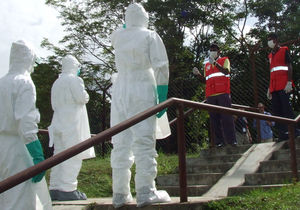So it’s a pandemic, now what? Let’s assume you’ve read through Michael’s post on contingency planning and his follow-up ‘the logistics of swine flu aid’ and your organisation has updated their pandemic preparedness plans, or is in the process of doing so now. Did you think of everything?

Meeting counterparts. Source: A.Cook
Let’s take another look at your;
- Supply chain
- Staff protection
- Programme operations
Supply chain and border crossings
Contingency planning done at country level with UN PIC and governments suggests an increased role of national military and police in case of a pandemic outbreak when national services and infrastructure will be impacted.
A high level of staff absenteeism (30% or higher) will extend to your suppliers; make sure to include them in your plans. Will your logistics staff and your shipping agent and main transporter be able to handle customs clearance and possible extra measures for quarantine and maintaining security of supplies? Do they know how to handle cold chain & clearance procedures for medicines & vaccines, which may be needed during a pandemic?
Staff protection
You’ve considered protective equipment for your staff who will be in contact with influenza patients (either at work or at home) and may have purchased particulate face masks, gloves and hand washing gel, maybe even Tyvek protection suits if you’re with a medical organisation.
Did you consider training for protective measures? A pandemic logistics simulation training P2LX in Nov.2008, found that a major part of using protective equipment is learning how to assess the level of risk and deciding when to use it. And: You learn by doing it, not by reading about it. Secondly, the protection of this type of equipment is only effective when used properly.
Programme operations
You went through the four steps as recommended in this earlier post ; prioritise your logistics, sensitivity analysis, contingency planning and communication.
Your contingency planning answered the important question: How will your programme operations adapt to a national pandemic situation, with significantly less human resources and an increased strain on the supply chain?
Does your pandemic preparedness plan extend to your offices at field level? And does it include your local implementing partners? If not, perhaps now is the time to sit down with your partners at field level to discuss their role and activities.
Take note that staff protection will also affect them. How will they deal with it when your staff has all the protective gear and they don’t? Things could get ugly.
In case you are with a medical organisation, did you consider the additional requirements or shift of focus of your programme if you’re suddenly confronted with a surge in influenza patients and deteriorating local healthcare services?
Conclusion
Now that H1N1 has spread globally and a pandemic has been officially declared a possibility is that we will continue to see a gradual increase in cases, until a larger local outbreak happens in a particular region or perhaps your country.
To maintain the key activities of your programme in the field during an outbreak, the basic principle of the supply chain still applies: the chain is only as strong as its weakest link. Your programme operations will only continue successfully if you have looked beyond your own organisation and included suppliers and local implementing partners in your planning, communication and training.
(Guestpost by Jurgen Hulst, @NFIguy)


{ 2 comments… read them below or add one }
I’m kind of sick of hearing about the H1N1 virus. More people die from the real flu than this flu. Over rated if you ask me. Everyone needs to just calm down about it.
@Cold chain logistics : You might be right — in hindsight. However, when this article was written (more than two months ago), there was no way that we could know that the swine flu virus would behave itself so differently from e.g. the Spanish flu of a century ago.
However, I think you also miss the point of this article: it is not so much about swine flu (although that is taken as the most poignant and recent example), but about pandemic preparation in general — and that is always a pertinent issue.
Thanks for your comment!